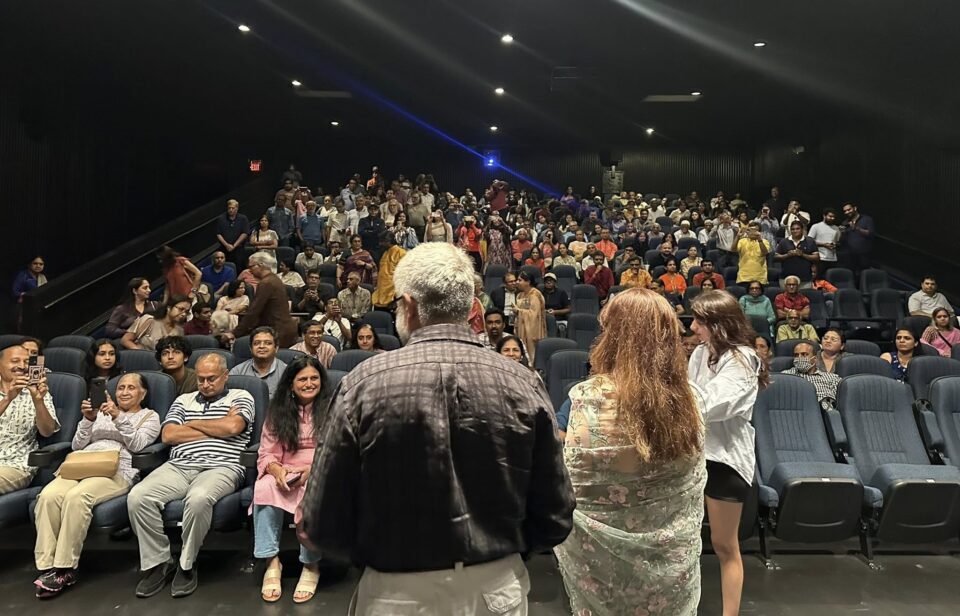BY JYOTHSNA HEGDE
Roswell, GA, August 1, 2025: On Saturday, July 26, an exclusive pre-release screening of The Bengal Files was hosted at Area 51 – Aurora Cineplex in Roswell, Georgia, drawing a full-capacity audience for the event. Organized by the Coalition of Hindus of North America (CoHNA), the Global Kashmiri Pandit Diaspora (GKPD), and the I Am Buddha Foundation, the program featured a live Q&A session with director Vivek Ranjan Agnihotri and producer-actor Pallavi Joshi following the film.
The Bengal Files is the third and final installment in Agnihotri’s “Files Trilogy,” which examines lesser-known or contentious chapters of Indian history. The trilogy began with The Tashkent Files (2019), exploring the circumstances surrounding the death of Prime Minister Lal Bahadur Shastri, and continued with The Kashmir Files (2022), which focused on the exodus of Kashmiri Pandits in the 1990s. The latest film portrays the tragic events surrounding Direct Action Day on August 16, 1946—also known as the 1946 Great Calcutta Killings. Through a cinematic narrative, it explores how the violence, initially concentrated in Calcutta, spread to surrounding regions of the Bengal Presidency, including the Noakhali riots and the Tipperah (Comilla) region.

Direct Action Day was declared by the All-India Muslim League as a political demonstration to demand a separate Muslim homeland following the British exit from India. Initially envisioned as a general strike and economic shutdown, the day escalated into large-scale communal violence between Hindus and Muslims in Calcutta. The clashes, which began on August 16, led to a week of intense bloodshed, often referred to as the “Week of the Long Knives.” While there is some consensus on the scale of the violence and its immediate effects, debates continue regarding the causes, sequence of events, and long-term political impact.
During the post-screening discussion, Vivek Agnihotri explained the motivations behind making the film. He noted that the project was developed to examine historical episodes that, in his view, have not received adequate attention in mainstream discourse. “We were never told about these events,” he said. “Every dialogue, every word, every shot, even the visuals you will see—I have not done anything. I’ve just translated them and replicated them.” He emphasized that the film is grounded in extensive documentation and research conducted over several years.

Agnihotri also spoke about the challenges associated with the film’s subject matter, including legal complications and political reactions. “There are some 5,000 FIRs filed against The Bengal Files,” he noted, adding that legal paperwork was ongoing at the time of the screening. He referenced public remarks made by the Chief Minister of West Bengal expressing opposition to the film and stated that, despite such criticism, the filmmakers intend to release it in India without alteration. “Nobody on this earth can stop it,” he said.
Pallavi Joshi provided further details on the research process. She explained that the team compiled over 18,000 pages of historical records and conducted interviews with survivors, particularly in regions near the Bangladesh border. “Some of the survivors we interviewed are over 90 years old,” she said. “They had firsthand memories of the events, including Direct Action Day.” She described logistical challenges during fieldwork, including temporary detention of crew members and the confiscation of recording equipment. Despite these obstacles, the team was able to document several survivor accounts.
Joshi also discussed the attention to linguistic and cultural accuracy in the film’s production. Characters were portrayed speaking in dialects appropriate to their region, and the soundtrack included rare devotional songs recorded by Parvati Baul, a traditional artist who agreed to contribute under special circumstances. “She had never sung for a film before,” Joshi said, noting the significance of her participation.

Audience members raised a range of questions during the Q&A, including the film’s prospects for release in India, the possibility of future projects on related themes, and the historical context of the events portrayed. Agnihotri responded by encouraging viewers to reflect on the subject matter and engage with it beyond the film. “Don’t write about the film—write about what it made you think,” he said, emphasizing the filmmakers’ intention to spark broader conversation about historical memory.
The event concluded with expressions of appreciation from attendees and brief remarks about the work of the I Am Buddha Foundation, which supports content rooted in historical research and civic engagement. For many in attendance, the screening offered a platform to encounter and discuss a complex period in India’s past through a contemporary cinematic lens.



